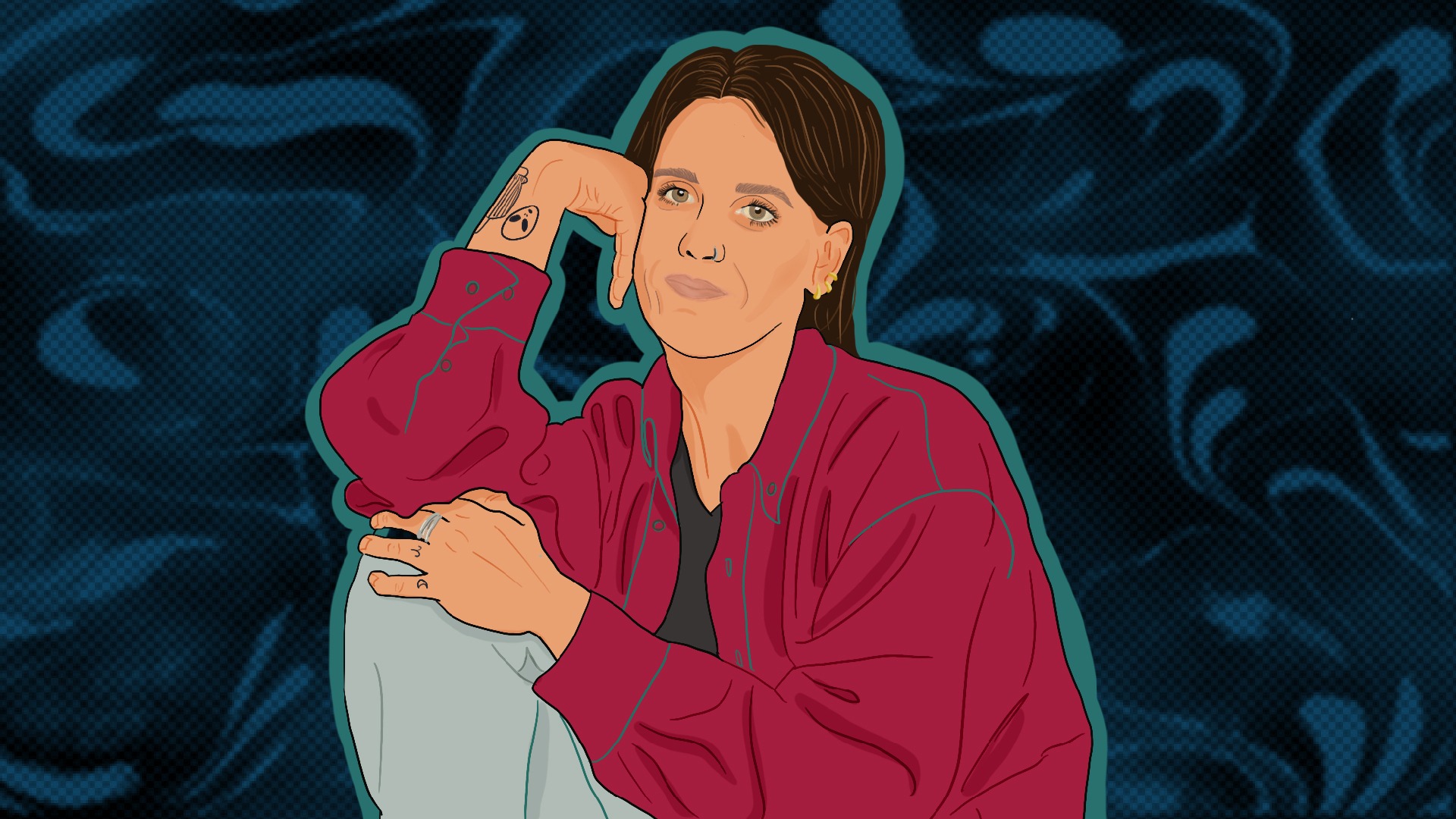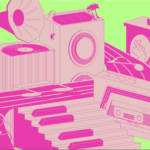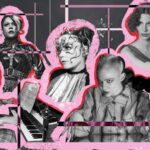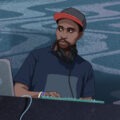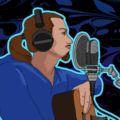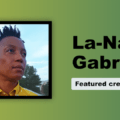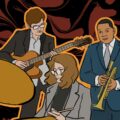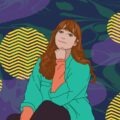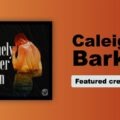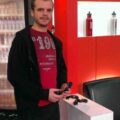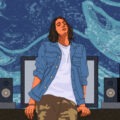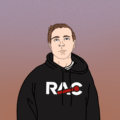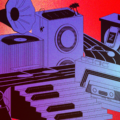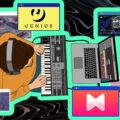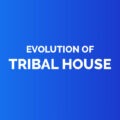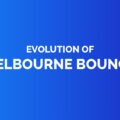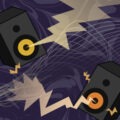Rapid Fire Questions
Favourite film score? I have two: Drive & Interstellar
An artist you’re currently obsessed with? Goddard (UK)
Favourite piece of art in your home? A painting of a Devil that my father gifted me. I get mixed reactions from it, but I enjoy it.
RAC alum Rebekah Bergeron-Taillefer has journeyed on a multifaceted creative path that has earned her the title of producer, sound engineer, live performer, film composer, and novelist – to name a few. She describes music not only as a lifelong passion, but also as her therapy.
The Montreal-born, Vancouver-based creative sat down with us to chat about her time at RAC, her growth as an artist, and the ups and downs of her career – from winning awards to working through mental health issues.
Early roots to RAC
From a young age, Rebekah developed a deep connection with music. She could often be found jotting down lyrics to tunes she was listening to, learning songs on the keyboard by ear, and even making mixtapes with her step-sister, where they would use a microphone to add commentary in between tracks. At the age of 18, she became drawn to hip hop through the influence of friends who began recording their own music. “I found myself captivated by their recording sessions and eagerly observed their creative process,” she explains.
Despite her growing fascination with sound recording and producing, she admits that her timid nature initially held her back from trying it out for herself. But, after moving downtown at 24 and having a heartfelt conversation with her mother about her passion, she happened to pass by an ad in the metro for the Recording Arts Canada program. “I interpreted it as a sign to pursue my musical aspirations,” Rebekah says. She describes the reasons that ultimately led her to enroll at RAC as: “My love for music, wanting to understand beyond what the ear captures, and wanting to find a way to be involved in the music scene while creating some income.”
Exploring the arts
When asked about her biggest influences, Rebekah mentions old-school hip hop, jazz, blues, classical, electronic, punk… “It’s challenging for me to pinpoint a single influence because I believe all types of music impact me,” she shares. This became even more apparent during her time at RAC. “I relished the journey of exploring various production styles across different genres of music,” she explains.
In addition to developing her skills as a producer, Rebekah began experimenting with visual art via Montreal’s electronic music scene – specifically the dubstep and DnB (drum and bass) communities. “Many of my friends were DJs and producers, so I started attending their shows regularly. During one of these events, I met a friend who was responsible for visual projections and lighting. He graciously invited me to join him and, under his guidance, I gained valuable skills.” Eventually, she began creating visual art and managing gigs of her own, embarking on an exciting journey at the intersection of music and art.
Breaking into the music industry
After finishing the RAC program, Rebekah completed a brief internship at MakeWay Studios where she honed her skills in recording, producing, and mixing primarily hip hop music. The opportunity came after meeting the owner (fellow RAC alum Brandon Hecht) through a friend, taking a chance and asking him for a job. To her, the experience was invaluable. “I learned the pressures of recording and troubleshooting during a session, and on the slower days, Jay Century, a very talented composer/producer, would sit down with me and share production tricks,” she shares.
Around the same time, the RAC alum stumbled upon the incredible opportunity to record a live Dizzy Gillespie tribute show in Ottawa, produced by Dizzy’s former drummer, Nasyr Abdul Al-Khabyyr, and Cypress Hernandez, owner of Precision SoundLab. Being a fan of jazz music, Rebekah loved the experience. And though she hadn’t previously worked extensively in live sound recording, the skills she acquired at RAC came in handy – setting up mics, making sure that all is connected and functioning well, EQ’ing the room, and mixing and mastering after the show.
On a personal level, it was also around this time that the creator began to explore making music under a new artist name: Kizunah. The idea for the name came to her on a ferry ride back from a trip to Haida Gwaii, B.C., with her father. According to the Japanese Government website, “Kizuna means the enduring bonds between people—close relationships forged through mutual trust and support.” “I liked the meaning behind it, as music creates bonds between people. I added the “H” at the end because my surname is spelt Rebekah, and I wanted to give it more of a personal touch,” she explains.
It was under Kizunah that Rebekah released her EP Lost in a Dream, which she describes as ethereal, space-inspired trap beats. And while she recalls the creation process of this project as an immersive and magical experience, it actually all started from her struggle with creating drum beats. “I was adamant about avoiding loop samples and determined to learn to craft them myself. My partner at the time offered valuable advice, suggesting that I explore unconventional ideas, like using different sounds as snares or hi-hats, rather than focusing solely on traditional drum sounds. Taking his advice, I experimented with various sounds and eventually crafted the drum beat.”
Circling back to her musical influences, Rebekah once again highlights the impact of visual art on her creative process. “A sound or a song can spark an idea for me, while descriptions of visual scenes can also be a source of inspiration. Being highly visual, many of my productions have prompted vivid stories in my mind.” This eventually led her into experimental and sound design work, where she found great pleasure in crafting evocative atmospheres and creating music suitable for cinematic contexts. “I was particularly eager to venture into film scoring,” she notes – and that’s exactly what she did.

On the big screen and beyond
As if the creator didn’t have enough on her resume, she went on to add the title of film composer when she worked on a couple short independent French films. One of the films, “In Vitro”, even went on to win the Best Music and Sound Award at the Film Gala Presentation for graduates of the Université de Montreal. Given her inclination towards incorporating visuals and music production, delving into this niche felt like a perfect fit for her.
However, Rebekah temporarily turned away from music after experiencing some tragic events in her personal life, such as losing close friends to addiction. This led her to pursue work in outreach and mental health support in Vancouver’s Downtown Eastside, a community grappling with profound addiction and homelessness challenges. “Due to the heaviness of the job, I was diagnosed with PTSD and depression. I tried to channel what I was feeling through music, but I had a hard time connecting with that side of me. I found myself in a state of isolation,” she reveals.
It was during that time that she began writing a novel – a fictional narrative rooted in real-life events. “My experiences [at work] were often traumatic, yet they fueled my determination to shed light on these issues. Writing this book became a cathartic process – a means to share my own story, amplify the voices of those affected, and foster empathy toward their struggles. Through the narrative of this book, I aim not only to tell a compelling story but also to impart important lessons gleaned from real-life encounters,” she says. The book, entitled Behind Skye’s Eyes, is expected to be released by the end of March.

While Rebekah is already making plans for a second novel, she does hope to make a return to music in the future and tell her story through sound. She also envisions working in the film industry once again, bringing together her passions for music, visual media, and storytelling.
Written by Andria Piperni
Illustration by Holly Li
